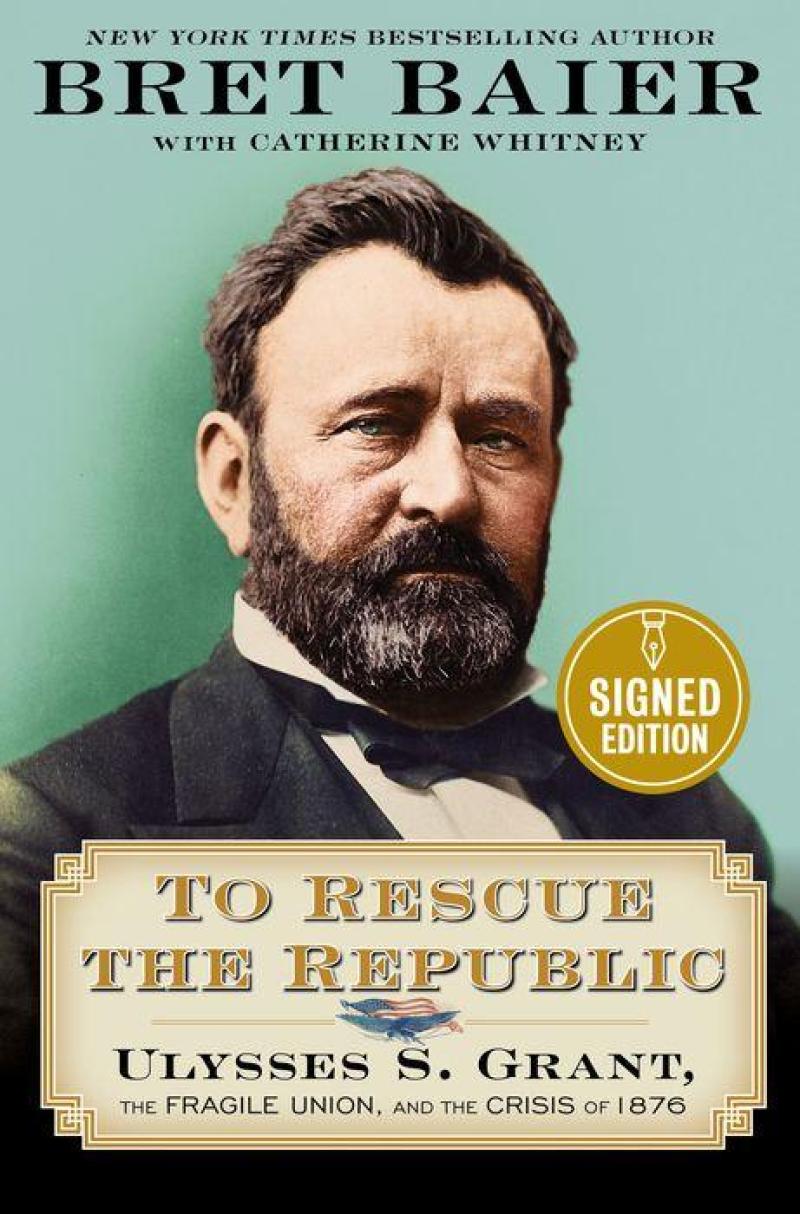To Rescue the Republic: Ulysses S. Grant, the Fragile Union, and the Crisis of 1876
By: Overview



The #1 bestselling author and Fox News Channel’s Chief Political Anchor illuminates the heroic life of Ulysses S. Grant
An epic history spanning the battlegrounds of the Civil War and the violent turmoil of Reconstruction to the forgotten electoral crisis that nearly fractured a reunited nation, Bret Baier’s To Rescue the Republic dramatically reveals Ulysses S. Grant’s essential yet underappreciated role in preserving the United States during an unprecedented period of division.
Born a tanner’s son in rugged Ohio in 1822 and battle-tested by the Mexican American War, Grant met his destiny on the bloody fields of the Civil War. His daring and resolve as a general gained the attention of President Lincoln, then desperate for bold leadership. Lincoln appointed Grant as Lieutenant General of the Union Army in March 1864. Within a year, Grant’s forces had seized Richmond and forced Robert E. Lee to surrender.
Four years later, the reunified nation faced another leadership void after Lincoln’s assassination and an unworthy successor completed his term. Again, Grant answered the call. At stake once more was the future of the Union, for though the Southern states had been defeated, it remained to be seen if the former Confederacy could be reintegrated into the country—and if the Union could ensure the rights and welfare of African Americans in the South. Grant met the challenge by boldly advancing an agenda of Reconstruction and aggressively countering the Ku Klux Klan.
In his final weeks in the White House, however, Grant faced a crisis that threatened to undo his life’s work. The contested presidential election of 1876 produced no clear victory for either Republican Rutherford B. Hayes or Democrat Samuel Tilden, who carried most of the former Confederacy. Soon Southern states vowed to revolt if Tilden was not declared the victor. Grant was determined to use his influence to preserve the Union, establishing an electoral commission to peaceably settle the issue. Grant brokered a grand bargain: the installation of Republican Hayes to the presidency, with concessions to the Democrats that effectively ended Reconstruction. This painful compromise saved the nation, but tragically condemned the South to another century of civil-rights oppression.
Deep with contemporary resonance and brimming with fresh detail that takes readers from the battlefields of the Civil War to the corridors of power where men decided the fate of the nation in back rooms, To Rescue the Republic reveals Grant, for all his complexity, to be among the first rank of American heroes.
Tags
Who is online
85 visitors


Another book on one of the most fascinating characters in America's rich history. He was the General whom Mary Lincoln called "a butcher." It was he who knew that all the numbers favored the Union, yet had the unenviable task of defeating Genearal Robert E Lee. It should be noted that Grant developed a strategy late in the war of continually outflanking Lee. Always moving on Lee's left he kept forcing Lee back, eventually Grant was able to lay seige to the ASrmy of Northern Virginia at Petersberg Virginia.
The presidency of Grant began on March 4, 1869, when Grant was inaugurated as the 18th president of the United States, and ended on March 4, 1877. The Reconstruction era took place during Grant's two terms of office. His presidency was marred by corruption, which may not have been his fault.
At any rate, the Book is
To Rescue the Republic: Ulysses S. Grant, the Fragile Union, and the Crisis of 1876
by Bret Baier and Catherine Whitney
[deleted]
Does it cover Grant's illegal war against the Indigenous Peoples of the Black Hills?
I suppose one would have to read it.
Btw "happy indigenous peoples Day"
A "happy columbus Day to you" /S
First of all, it's Columbus. Second of all, you might have known that Columbus never set foot in the continental United States. (No sarcasm)
First of all, it's Indigenous Peoples.
That not a persons name.
Neither are days of the week.
Have a good one.
Hey Vic.. Given the title of the book and the 'biography' sort summary I am doubting that his disregard of the Laramie treaty signed in '68 under Johnson is a chapter in the book .. but perhaps it is,, you are correct one must read it, but it will not be me : )
To me Grant was a 'hero' in the Civil War .. but not so much after.
Happy Indigenous Peoples Day to you as well Vic.. : )
Last night at 10 PM, Bret Baier actually walked the viewer through the period of reconstruction when Grant was President. You may be surprised to find how Grant fought against all the attepts made by Andrew Johnson and the southerners to undo the terms of Reconstruction. I ordered it after I saw that
Interesting .. was Grant in Congress? I may have to review my history - but didn't Johnson try his hand at 'reconstruction' while congress was out on recess .. once they reconvened on 1865 they refused to seat the Confederate delegates, not wanting to allow the Confederate states back in the Union so easily .. in 1866 the Freedmen's Bureau Act and the Civil Right Act was vetoed by Johnson, but congress overrode the veto.
... like I said I may need to review what I recall of history ... but I thought Congress then controlled the process involving reinstatement of confederate states ...
You will have to let me know how the book is Vic .. I am curious, just not enough to read it ... [snicker] : )
Peace Vic
No
but didn't Johnson try his hand at 'reconstruction' while congress was out on recess ..
Yes
once they reconvened on 1865 they refused to seat the Confederate delegates, not wanting to allow the Confederate states back in the Union so easily .. in 1866 the Freedmen's Bureau Act and the Civil Right Act was vetoed by Johnson, but congress overrode the veto.
Um-hum
but I thought Congress then controlled the process involving reinstatement of confederate states ...
To a large extent yes, (btw there is a great article on this), but it was Grant who had to see that it got done:
During Grant’s two terms, he strengthened Washington’s legal capabilities to directly intervene to protect citizenship rights even if the states ignored the problem. He worked with Congress to create the Department of Justice and Office of Solicitor General, led by Attorney General Amos Akerman and the first Solicitor General Benjamin Bristow. Congress passed three powerful Enforcement Acts in 1870 and 1871. These were criminal codes which protected the Freedmen’s right to vote, hold office, serve on juries, and receive equal protection of laws. Most important, they authorized the federal government to intervene when states did not act. Grant’s new Justice Department prosecuted thousands of Klansmen under the tough new laws. Grant sent federal troops to nine South Carolina counties to suppress Klan violence in 1871.
Grant also used military pressure to ensure that African Americans could maintain their new electoral status, won passage of the Fifteenth Amendment giving African Americans the right to vote, and signed the Civil Rights Act of 1875, which gave people access to public facilities regardless of race. To counter vote fraud in the Democratic stronghold of New York City, Grant sent in tens of thousands of armed, uniformed federal marshals and other election officials to regulate the 1870 and subsequent elections. Democrats across the North then mobilized to defend their base and attacked Grant’s entire set of policies. On October 21, 1876, President Grant deployed troops to protect black and white Republican voters in Petersburg, Virginia.
You will have to let me know how the book is Vic ..
Will do!
Peace Vic
You too!
Thanks for the link Vic
Lol...
Ooo? Do share the humor..
The idea that the the War was illegal is funny.
Ulysses S. Grant Launched an Illegal War Against the Plains Indians, Then Lied About It | History | Smithsonian Magazine
There was nothing illegal' about what Grant did. Period.
That piece is almost laughably one sided. How do you read stuff like that and not laugh at how ham handed it is? There's no there, there. It's just innuendo (Grant nominated the cabinet member he wanted!. As Commander in Chief he spoke to a Major General! ) The horror!
Indeed it was!